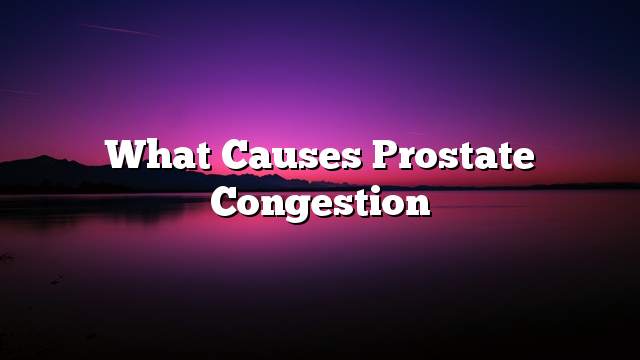The prostate
The prostate gland is located at the origin of the urethra, under the bladder, around the tube that carries the urine out of the body, and its size is the size of the small kiwi fruit. The prostate gland weighs between 20 and 30 grams, while the prostate gland can weigh up to 100 grams and is classified as part of the exocrine system. This gland produces fluids for a range of external functions of the body. The prostatic gland secretes a milky substance that makes up about 20 to 30% of the semen, and also has muscles that help to expel semen during ejaculation.
Prostate congestion and causes
Prostate congestion is a general term that indicates the accumulation of fluid in the prostate and thus its enlargement, which adversely affects the urethra, and causes pain in that area. The cause of the prostate congestion to several things, ranging from increasing sexual desire without emptying this desire, and up to prostate cancer, and come some of the most important causes of prostate congestion:
- Many young people practice masturbation, and excessive exercise may cause prostate congestion, in addition to excessive sexual intercourse, especially if the man resorted to the process of isolation at the time of intercourse; the holding of sperm to be thrown out of the vagina.
- Some of the bad habits of some young people, such as watching movies and sexual images that cause him to suppress and sexual irritation.
- Drink plenty of stimulants, such as: tea, coffee, and some types of spices.
- Lack of drinking water, and drinking too much alcohol.
- Testicular pain during orgasm, which is the result of congestion of blood in the blood vessels that feed the genital area; because this pain usually prevents ejaculation.
- Prostate enlargement, which is a benign enlargement by its nature.
- Prostate cancer.
- Cysts in the urinary tract.
- Frequent constipation.
- Spinal cord injuries.
- Hormonal imbalance especially in older people aged 55-65 years.
- Bacterial and non bacterial infections.
Symptoms of prostate congestion
There are a number of symptoms of persistent prostate congestion, but it is worth noting that the symptoms vary according to the cause of congestion, and some of the symptoms that spread among patients in general, the following:
- If the cause is inflammation, its symptoms are similar and symptoms of colds associated with tremor in the body, high temperature, upper bladder pain and lower back.
- The patient finds the prostate difficult to get urine, with an urgent desire to urinate constantly.
- When intercourse and sexual intercourse, ejaculation is accompanied by pain.
- Swelling of the prostate gland.
- Falling points of blood with urine and semen.
- Burning during or after urination.
- The sensation that the bladder can not be completely emptied.
- Pain with pain above the penis, or under the scrotum, or in the back, or rectum.
Diagnosis of the disease
Teenagers are the most vulnerable group of the prostate. Each young person in this group, if he feels bladder pain or difficulty in urinating with the pain, should see the doctor immediately to find out. The discovery of this disease in its early stages is easy to treat If the doctor doubts that the patient is suffering from prostate inflammation or any other problem in the same gland, the patient should be referred to a urologist (a doctor specializing in urology and male reproductive system) to confirm that diagnosis, And subject to Patients are usually subjected to comprehensive tests, including a manual prostate examination of the rectum, where the finger is placed in the rectum and the prostate is examined for any unusual swelling or pain when touched. This procedure is painless and takes a minute or two, It may be embarrassing for many men.
If the doctor is still not sure what the patient is experiencing, he or she will have to do more tests, such as analyzing prostate fluids to look for signs of infection, cross-rectal ultrasound, biopsy, or urine tests to determine which part of the urinary or reproductive system He is the injured.
Methods of treatment and prevention of prostate congestion
Treatment of prostate congestion with the treatment of the cause, and in general, here are some treatments and methods of prevention of this disease:
- Use antibiotics if the cause of the disease is bacterial infections.
- Use painkillers to get rid of pain.
- Use of muscle relaxants.
- The use of some anti-depressants that studies have shown to relieve pain.
- Physical treatments for the pelvis that help relax the pelvic muscles, relieve the pain and congestion found in the prostate.
- The use of alpha blockers, a medication that relaxes muscles in the prostate and bladder neck, can help improve the flow of urine and relieve pain during urination.
- Use of anti-inflammatories and cortisone to reduce congestion.
- Prostate massage can also be helpful. The pressure on the prostate gland is forced to try to break up or release areas of inflammation and congestion in the gland. In practice, ejaculation does this function of course, but some feel that forced and painful massage is more effective.
- The use of surgery, a solution and the last option.
- A person suffering from prostate congestion should drink plenty of fluids and clean water with 10 cups of biomass in order to reduce the output of concentrated yellow urine.
- Take care to empty the bladder of the urine completely by sitting in a 4-way to press the bladder and ensure the descent of urine.
- Stay away from stimulants, such as tea, coffee, and soft drinks.
- Frequent movement, not sitting for long periods.
- Eat lots of vegetables, fruits and yogurt.
- Sleep for sufficient periods, not less than eight hours and not exceeding.
